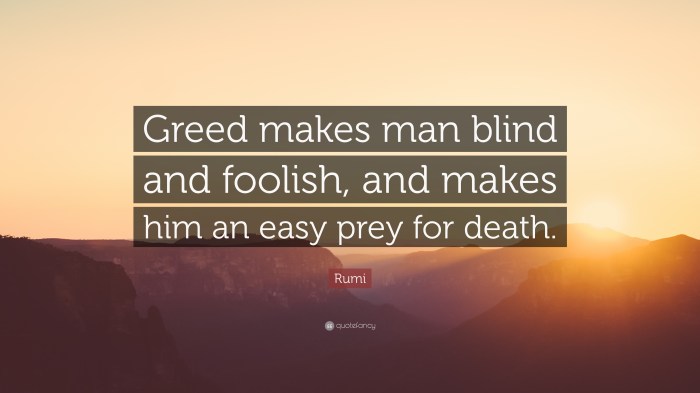Greed quotes in The Great Gatsby offer profound insights into the corrupting power of wealth and materialism, revealing the devastating consequences it has on individuals and society.
The novel explores the characters’ relentless pursuit of material possessions, their misguided belief in its ability to bring happiness, and the moral decay that greed inevitably breeds.
The Importance of Money and Materialism
F. Scott Fitzgerald’s The Great Gatsby is a novel that explores the themes of wealth, status, and the American Dream. The characters in the novel are obsessed with money and material possessions, and their pursuit of these things often leads to tragic consequences.
One of the most striking examples of the characters’ obsession with wealth is the way they spend money. Gatsby, for example, throws lavish parties in an attempt to win Daisy’s love. He buys expensive cars, clothes, and jewelry, and he even has a custom-built mansion.
However, all of this spending does not make him happy. In fact, it only serves to isolate him from the people he cares about.
The Consequences of Greed and Materialism
The pursuit of wealth and materialism can have devastating consequences. In The Great Gatsby, greed and materialism lead to the deaths of several characters, including Gatsby himself. Gatsby’s obsession with Daisy ultimately leads to his downfall. He is unable to accept that she is not the perfect woman he has imagined, and he is unwilling to give up his dream of winning her back.
This ultimately leads to his death at the hands of Tom Buchanan.
The Great Gatsby is a cautionary tale about the dangers of greed and materialism. Fitzgerald shows us that the pursuit of wealth and status can never truly make us happy. In fact, it can often lead to our downfall.
The Corrupting Power of Greed

Greed is a destructive force that can corrupt even the most virtuous of individuals. In The Great Gatsby, F. Scott Fitzgerald explores the corrupting power of greed through the characters of Jay Gatsby, Tom Buchanan, and Daisy Buchanan. These characters are all consumed by their desire for wealth and material possessions, and their greed leads to their moral decay and the loss of their values.
The Corrupting Influence of Greed on Jay Gatsby
Jay Gatsby is a self-made millionaire who has achieved great wealth through questionable means. He is driven by his desire to win back Daisy Buchanan, the love of his life. However, Gatsby’s greed corrupts him and leads him to make increasingly reckless decisions.
He becomes involved in organized crime and is willing to do whatever it takes to achieve his goals. Gatsby’s greed ultimately leads to his downfall when he is murdered by George Wilson, the husband of his mistress, Myrtle Wilson.
The Illusion of Happiness and Fulfillment

The Great Gatsby presents a critique of the American Dream and the illusion of happiness that material wealth can provide. Many characters in the novel believe that wealth and possessions will bring them happiness, but their pursuit of greed ultimately leads to disappointment and emptiness.
Characters’ Belief in Material Happiness
Several characters in The Great Gatsby express the belief that wealth and material possessions will bring them happiness. For example, Gatsby himself believes that acquiring wealth will allow him to win back Daisy Buchanan, the woman he loves. He throws lavish parties and buys expensive clothes and cars in an attempt to impress her.
Another character, Tom Buchanan, also believes that wealth and status will bring him happiness. He is a wealthy man who is married to Daisy, but he is not satisfied with his life. He has an affair with Myrtle Wilson, a woman from a lower social class, in an attempt to find happiness outside of his marriage.
The Corrupting Power of Greed
The pursuit of greed ultimately leads to disappointment and emptiness for the characters in The Great Gatsby. Gatsby’s dream of winning back Daisy is ultimately unfulfilled, and he is killed by Tom Buchanan in a jealous rage. Tom’s affair with Myrtle Wilson also ends in tragedy, as Myrtle is killed by Daisy’s car.
The novel shows that the pursuit of wealth and material possessions can corrupt people and lead them to make destructive choices. Gatsby’s obsession with Daisy leads him to become a criminal, and Tom’s affair with Myrtle leads him to commit murder.
Critique of the American Dream
The Great Gatsby also critiques the American Dream, which is the belief that anyone can achieve success and happiness through hard work and determination. The novel shows that the American Dream is not always attainable, and that even those who achieve success may not find happiness.
Gatsby’s story is a tragic example of the failure of the American Dream. He works hard to achieve wealth and success, but he is ultimately unable to win back Daisy or find happiness. The novel suggests that the American Dream is an illusion, and that true happiness cannot be found in material possessions.
The Impact of Greed on Society: Greed Quotes In The Great Gatsby

In The Great Gatsby, Fitzgerald exposes the corrosive effects of greed on both individuals and society. Greed undermines social cohesion, perpetuates inequality, and corrupts the pursuit of happiness.
Greed and Social Inequality, Greed quotes in the great gatsby
Greed exacerbates social inequality by concentrating wealth in the hands of a few, while leaving others impoverished. In Gatsby’s world, the wealthy elite, like Tom Buchanan, live in extravagant mansions and indulge in lavish parties, while the working class, represented by characters like George Wilson, struggle to make ends meet.
Fitzgerald illustrates this disparity through the character of Myrtle Wilson, who is trapped in an unhappy marriage and seeks solace in an affair with Tom. However, Tom’s greed and selfishness lead him to abandon Myrtle, leaving her vulnerable and alone.
Greed and Unchecked Capitalism
The novel also critiques the dangers of unchecked capitalism, which can foster a culture of greed and materialism. Gatsby’s relentless pursuit of wealth and status ultimately leads to his downfall. His dream of winning Daisy’s love is tainted by his materialistic desires, and he fails to find true happiness.
Fitzgerald suggests that the pursuit of wealth can become an empty and destructive obsession. The characters in the novel are constantly striving for more, but their desires never seem to be satisfied. This endless cycle of greed leads to a society that is both morally and economically bankrupt.
Greed and the Importance of Ethical Values
In contrast to the characters who are consumed by greed, Fitzgerald presents characters like Nick Carraway, who represents the importance of ethical values and compassion. Nick’s refusal to participate in the corrupt world of the wealthy elite highlights the need for individuals to resist the allure of greed and strive for a more just and equitable society.
Essential FAQs
What is the significance of greed in The Great Gatsby?
Greed is a central theme in the novel, driving the characters’ actions and leading to their downfall.
How does greed corrupt the characters in the novel?
Greed corrupts the characters morally, leading them to make selfish and unethical decisions.
What is the societal critique of greed presented in the novel?
The novel critiques the unchecked capitalism of the Roaring Twenties and its corrosive effects on society.

